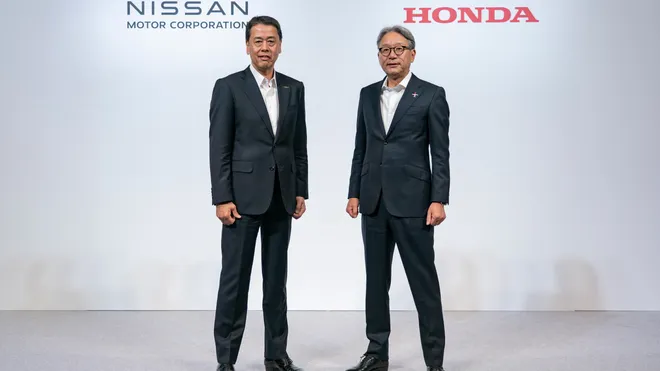Nissan and Honda Discuss Potential Merger to Tackle EV Market
In a development that could reshape the global automotive landscape, shares of Nissan Motor surged a record 23.7% on Wednesday following reports of merger talks with fellow Japanese automaker Honda Motor. This potential union, which would form a formidable entity to rival global industry leaders, is seen as a strategic response to the increasing demands of the electric vehicle (EV) market and intense competition.
Historic Surge for Nissan, Diverging Reactions for Honda and Mitsubishi
Nissan’s share price saw its best performance since at least 1985, according to data from FactSet, while Honda shares experienced a contrasting 3% dip. Mitsubishi Motors, in which Nissan holds a 24% stake, also rallied, closing 19.7% higher. The market movements were sparked by a report in the Nikkei newspaper suggesting that Nissan and Honda are in talks to operate under a single holding company. Mitsubishi Motors would eventually join the alliance as part of the proposed plan.
While Nissan did not confirm the merger, the automaker acknowledged exploring potential collaborations with Honda and Mitsubishi Motors. “No decisions have been made,” the company said in a statement, emphasizing that the reports were not based on an official announcement.
Strategic Need for Collaboration
The merger discussions come at a time when Nissan has been struggling with financial underperformance. The automaker recently posted disappointing second-quarter results, slashed its revenue forecast, and announced plans to cut 9,000 jobs while reducing global production capacity by 20%.
Industry experts view the merger as a lifeline for Nissan. Joe McCabe, CEO of AutoForecast Solutions, told CNBC that the automaker’s lack of a leadership position in its segments underscores the need for a “revitalization.” Nissan’s tumultuous relationship with Renault has further highlighted the necessity for a fresh strategic direction.
Honda, Japan’s second-largest automaker, also stands to gain from the partnership. Vivek Vaidya, global client leader for mobility at Frost & Sullivan, said the merger would enable both companies to share technology, de-risk innovation, and achieve economies of scale.
Synergy in EV and Traditional Markets
A potential Nissan-Honda-Mitsubishi alliance would create a diversified portfolio, combining expertise in internal combustion engine (ICE) vehicles, hybrids, battery electric vehicles (BEVs), and hydrogen-powered cars. This breadth of capabilities would position the group to tackle the global transition to EVs, a market currently led by Tesla and China’s BYD.
The combined entity would achieve annual vehicle sales exceeding 8 million units, surpassing most automakers but still trailing Toyota and Volkswagen, which reported sales of 11.2 million and 9.2 million vehicles, respectively, in 2023.
Global Challenges and Industry Trends
The potential merger mirrors a larger trend of consolidation in the auto industry as manufacturers grapple with EV investments, supply chain disruptions, and changing geopolitical landscapes. Earlier this year, Nissan and Honda had already entered a strategic partnership for shared automotive components and software, paving the way for deeper collaboration.
Industry analysts compare the prospective deal to the creation of Stellantis in 2021, formed by the merger of Fiat Chrysler and PSA Groupe. Like Stellantis, a Nissan-Honda-Mitsubishi merger would provide the scale needed to weather global challenges.
However, uncertainties remain, including potential tariffs proposed by U.S. President-elect Donald Trump that may necessitate extensive reorganization of supply chains.


Comments are closed.